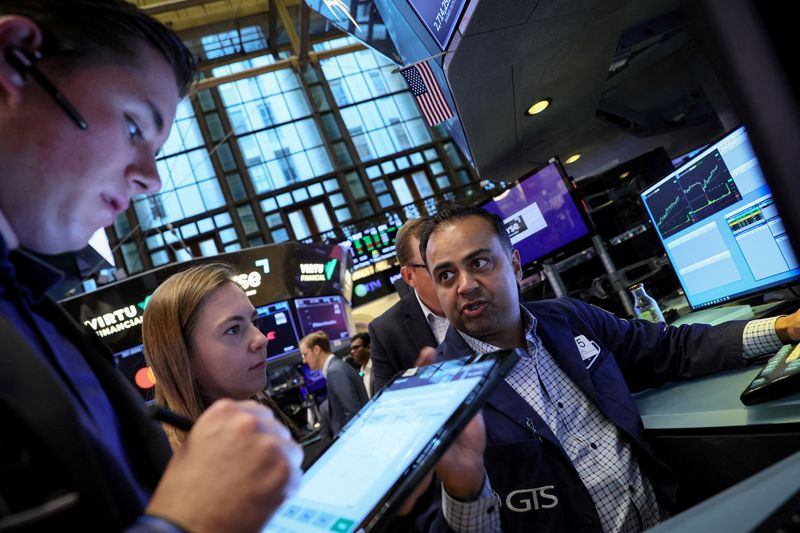Futures slip, Goldman Sachs cuts recession chances - what's moving markets
- 6 Σεπ 2023
- διαβάστηκε 4 λεπτά

Investing.com -- U.S. stock futures edge down following the Labor Day holiday, with traders trying to suss out the path ahead for price gains and the wider economy. Meanwhile, Goldman Sachs reduces the chances that America will slip into a recession over the next 12 months, pointing to recent labor and inflation data. Elsewhere, weak overseas demand weighs on activity in China's services sector.
1. Stock futures lower
U.S. stock futures inched lower on Tuesday, as investors attempt to parse out the health of the broader economy and gauge price pressures following the end-of-summer holiday.
At 05:18 ET (09:18 GMT), the Dow futures contract slipped by 46 points or 0.1%, S&P 500 futures edged down by 12 points or 0.3%, and Nasdaq 100 futures lost 65 points or 0.4%.
The main indices were mixed to end the previous trading week, with the benchmark S&P 500 and 30-stock Dow Jones Industrial Average posting gains and the Nasdaq Composite dipping marginally. However, on a weekly basis, all three finished in the green.
Data on Friday showed that the unemployment rate unexpectedly rose in August, while average hourly wage growth eased.
The figures bolstered expectations that the Federal Reserve would keep interest rates steady at its September meeting. Prior to the two-day gathering, more crucial economic releases -- including fresh inflation numbers -- are due out.
2. Goldman Sachs lowers chance of U.S. recession
Analysts at Goldman Sachs seem to be more persuaded that the U.S. economy will avoid a massive contraction in the near term despite a recent spike in borrowing costs.
The investment bank on Tuesday lowered the probability that the country would fall into a recession in the next 12 months to 15% from 20%, citing positive inflation data and last week's labor market report.
Goldman also predicted that the drag from the Fed's long-standing monetary tightening cycle will continue to lessen before "diminishing entirely" early next year. Meanwhile, the analysts highlighted Fed Chair Jerome Powell's current "careful" approach to future rate decisions, arguing it is a signal that a September hike is "off the table." The case against a November increase is also "significant," they added.
Ideally, Fed officials would like their campaign of interest rate hikes to cool inflation back down to its 2% target without causing an economic collapse -- a scenario known as a "soft landing."
3. China services sector activity slumps to eight-month low
Chinese services sector activity grew at a slower-than-expected pace in August, according to a private survey on Tuesday, due mainly to stuttering overseas demand.
The Caixin China General Services purchasing managers’ index (PMI) came in at 51.8 in August, lower than expectations for a reading of 53.6 and July’s figure of 54.1, Caixin Insights said in a statement. It was the index’s weakest showing in eight months.
Stock markets in China fell in the wake of the data, as concerns continued to mount around the country's flagging post-pandemic recovery. The Shanghai Shenzhen CSI 300 and Shanghai Composite indices dropped by around 0.7% each, while Hong Kong’s Hang Seng index slid 2.3%.
Shares in Country Garden (HK:2007) pared back some losses on reports that the ailing property giant had made payments on two dollar bonds before the end of a 30-day grace period, narrowly avoiding a potential international debt default. The developer previously missed the payments last month, starting a grace period that was set to end this week and exacerbating fears over the state of China's key real estate sector.
4. Oil dips as Chinese economic woes weigh
Oil prices edged down on Tuesday after the Chinese services activity data stoked worries over further headwinds to the world's second-largest economy and biggest crude importer.
Yet these losses were mitigated by expectations that major oil producers and leading OPEC+ members Saudi Arabia and Russia would announce more output reductions this week that could lead to tighter global supplies.
Crude prices remain near some of their highest levels in months. By 05:26 ET, the U.S. crude futures traded 0.2% lower at $85.35 a barrel, hovering near a mark last touched in November. Meanwhile, the Brent contract dropped 0.6% to $88.47 per barrel, but was still close to its highest point since late-January.
5. OpenAI founder receives "Golden Visa" from Indonesia
Indonesia has given OpenAI Chief Executive Sam Altman its first-ever "Golden Visa," as Southeast Asia's biggest economy attempts to attract foreign investors.
The 10-year "Golden Visa" grants the co-founder of the company behind ChatGPT the right to stay for longer periods in Indonesia, as well as perks like priority screening at airports around the country. In a statement, a government official said "the hope" is that Altman aids the domestic development and use of AI.
Altman visited Indonesia earlier this year as part of a tour of several Asian cities. According to Bloomberg News, it was unclear if he had applied for the visa or planned to invest in Indonesia.
Designed as a scheme to boost its national economy, the visa allows foreigners who make large investments in Indonesia to remain for between five to ten years. Similar visas have also been rolled out in the U.S., Ireland, Spain and New Zealand in a bid to bring in more capital and entrepreneurial residents.





Σχόλια